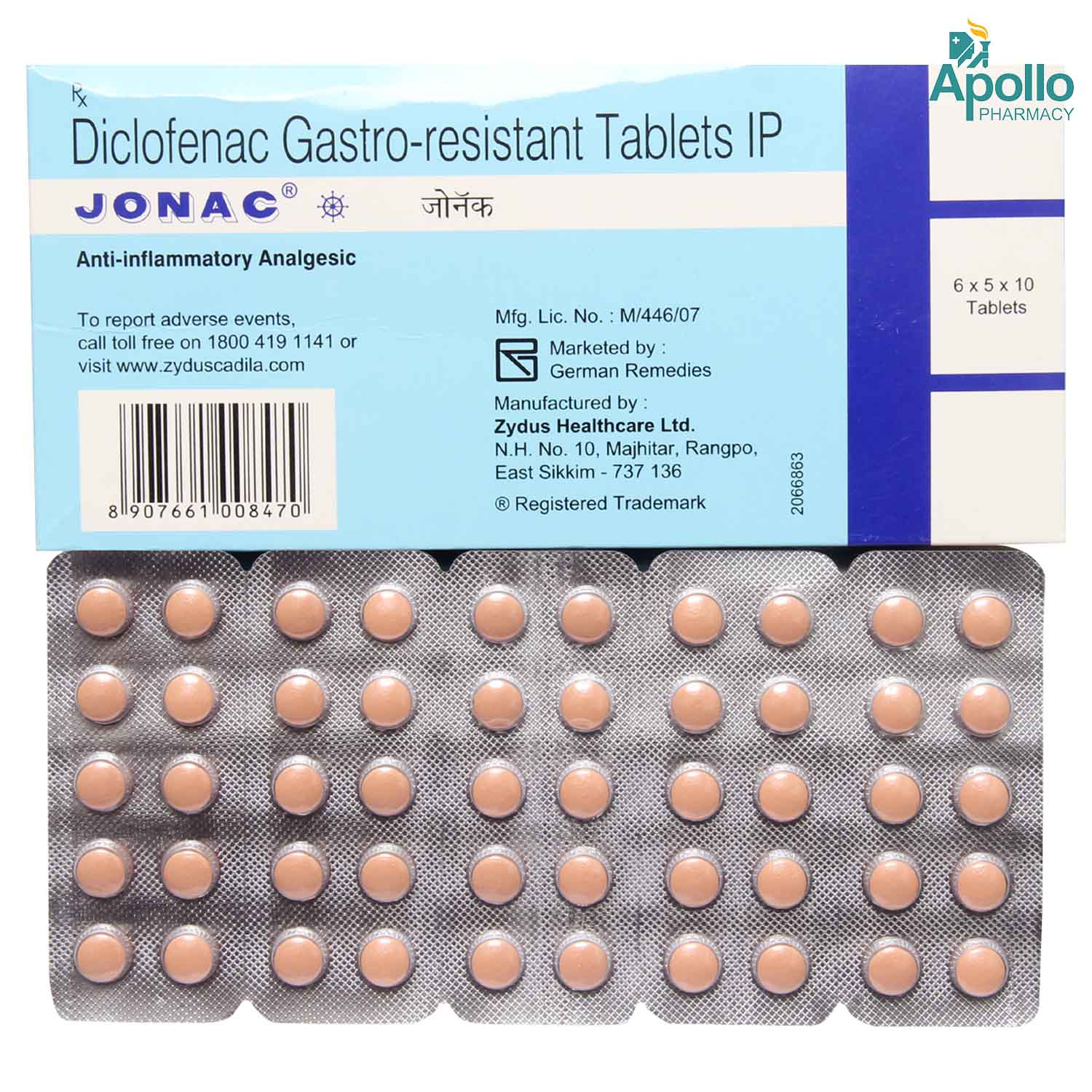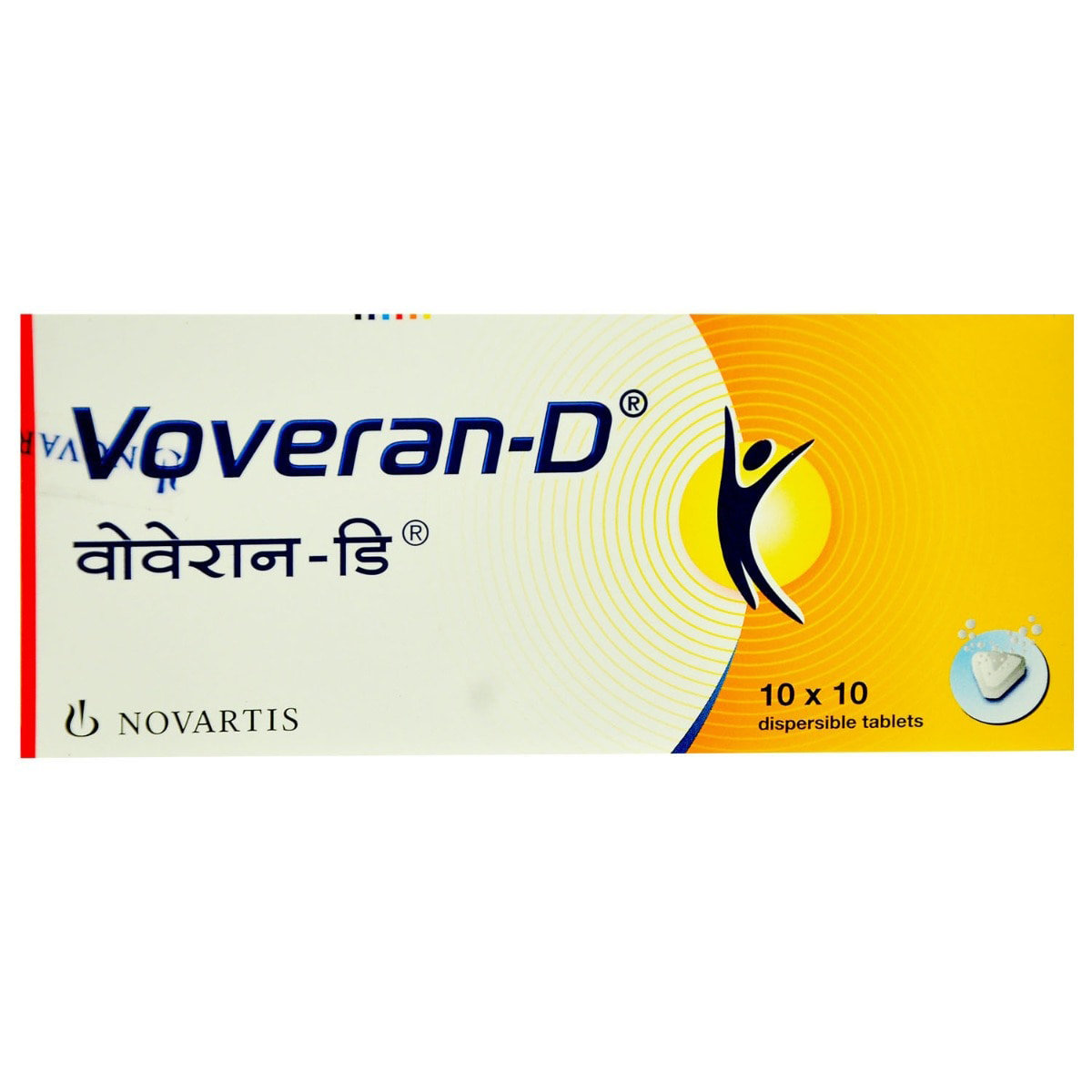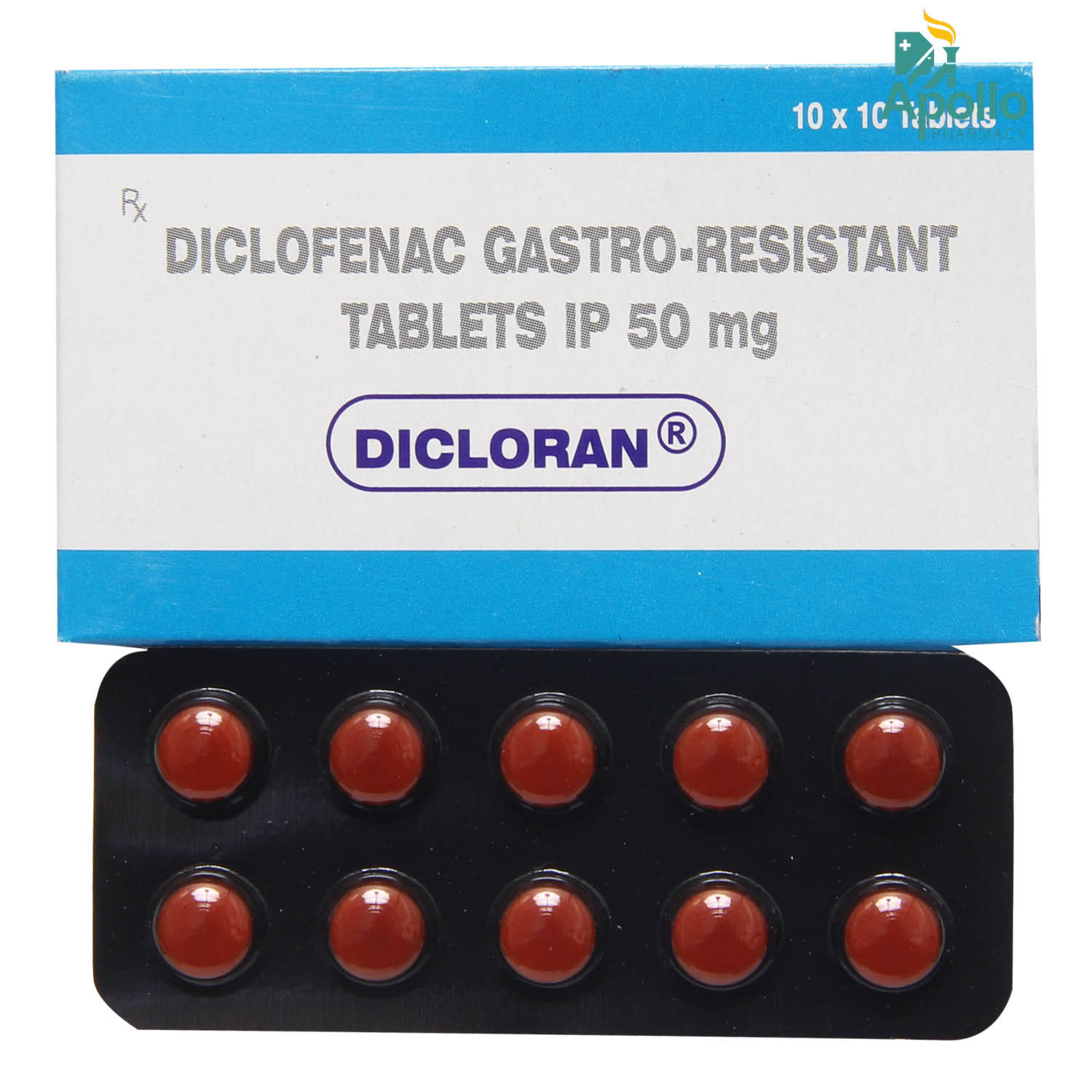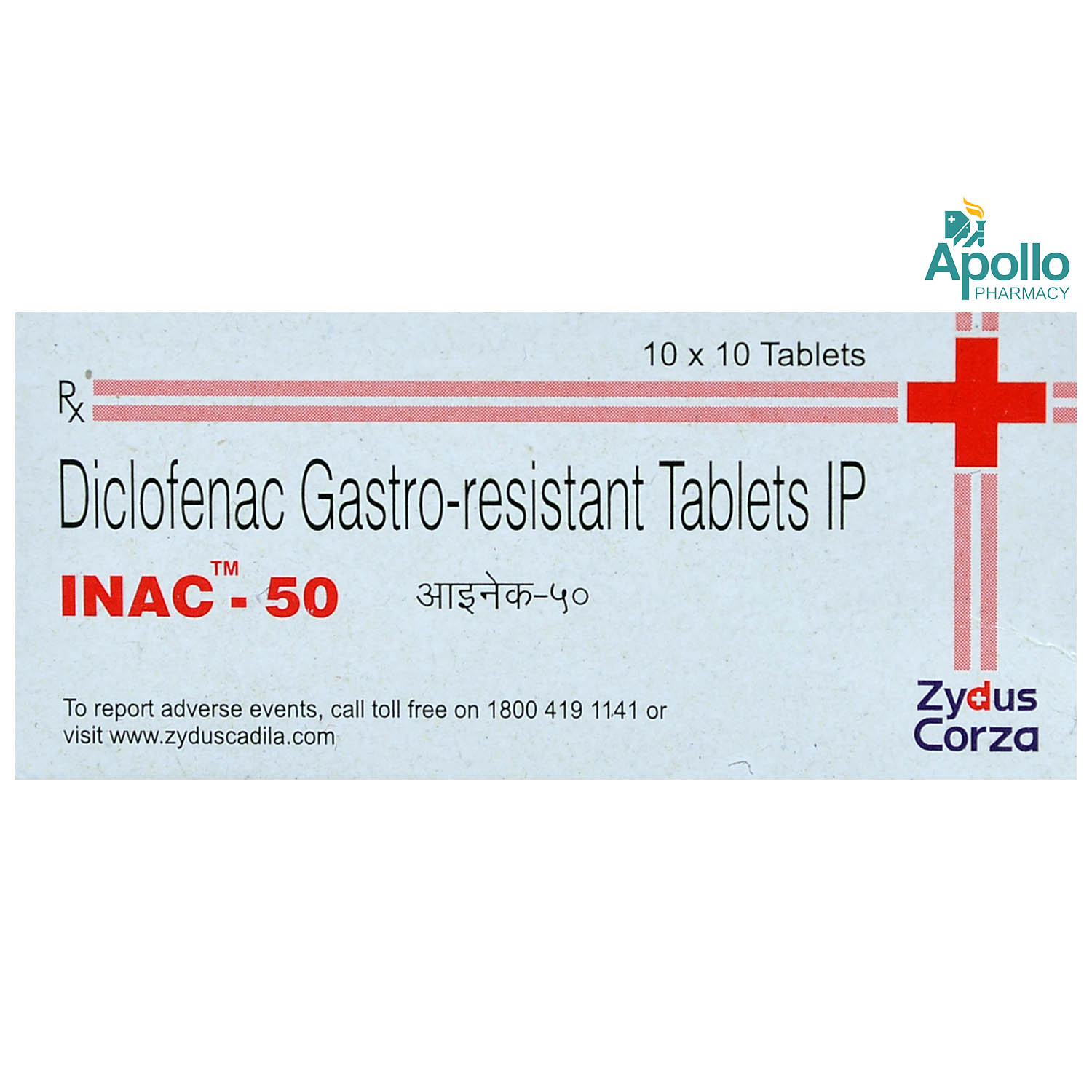Nac 50 Tablet 10's
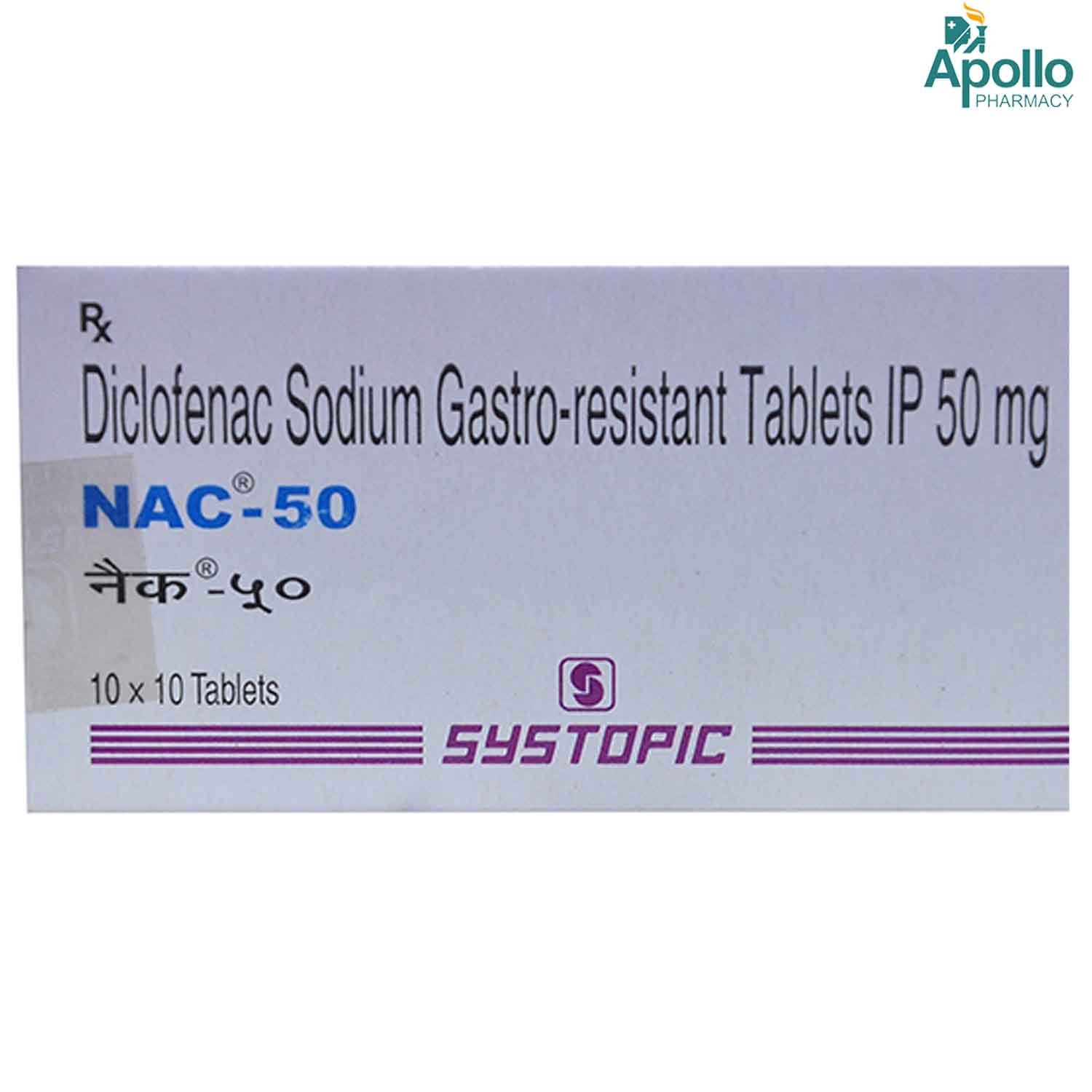
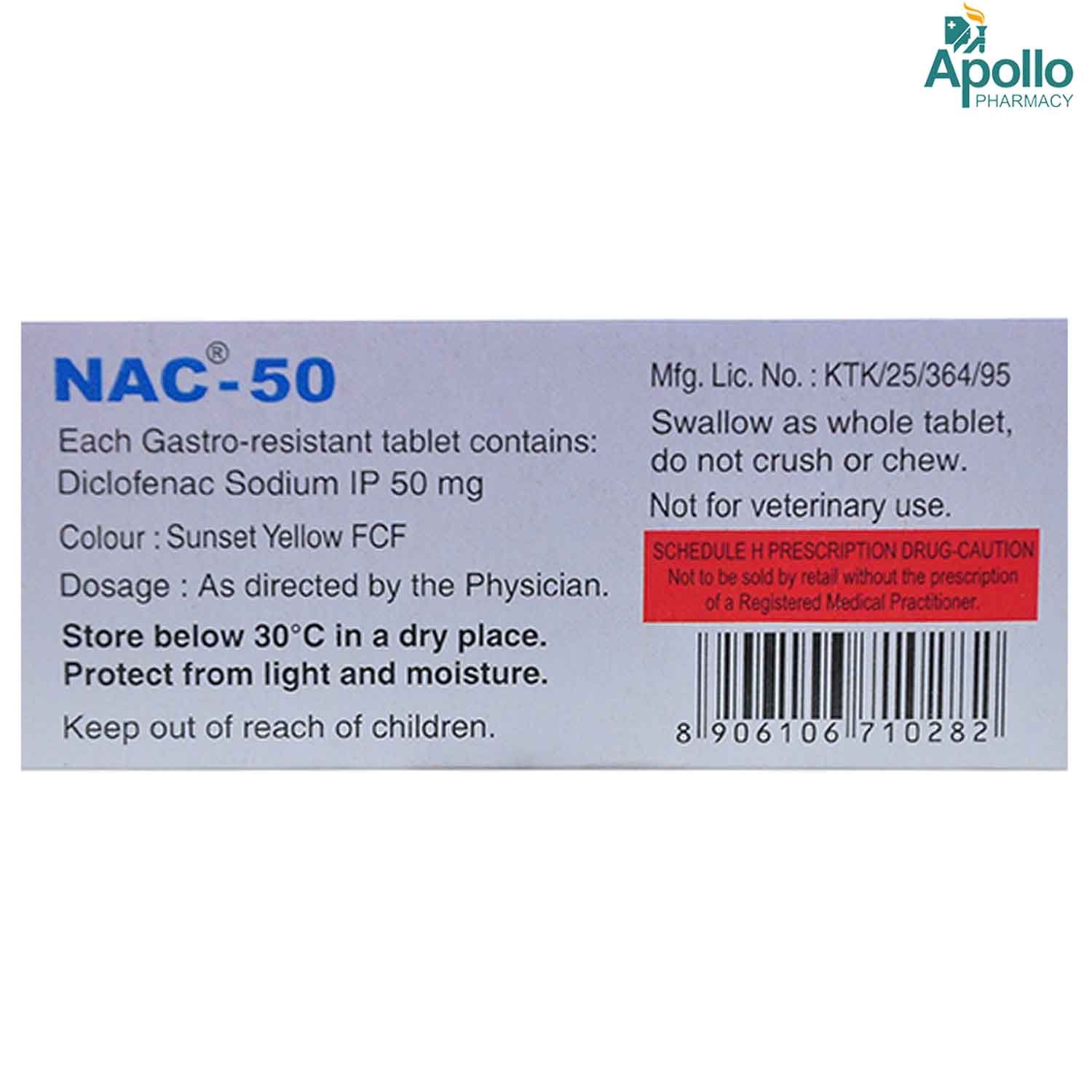
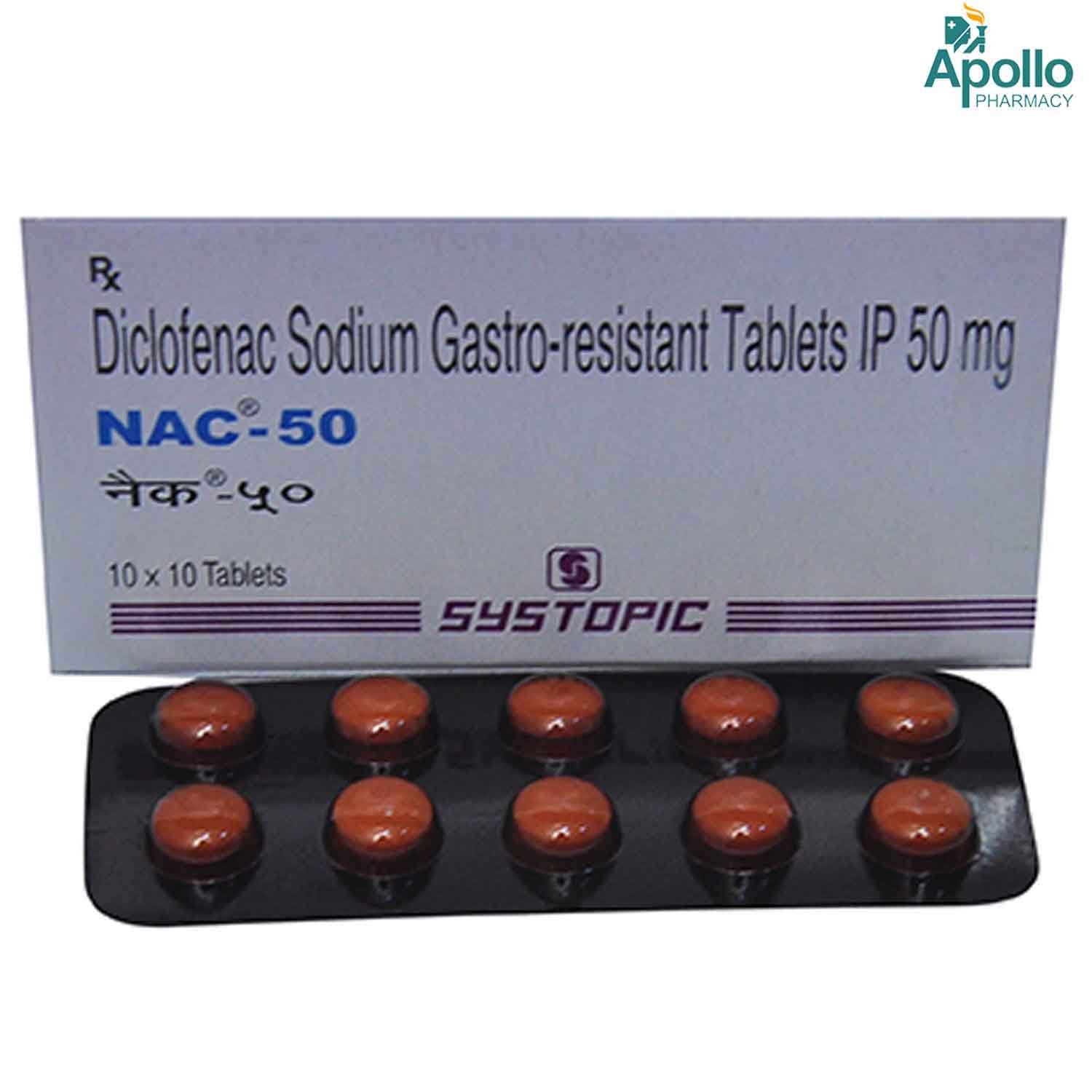
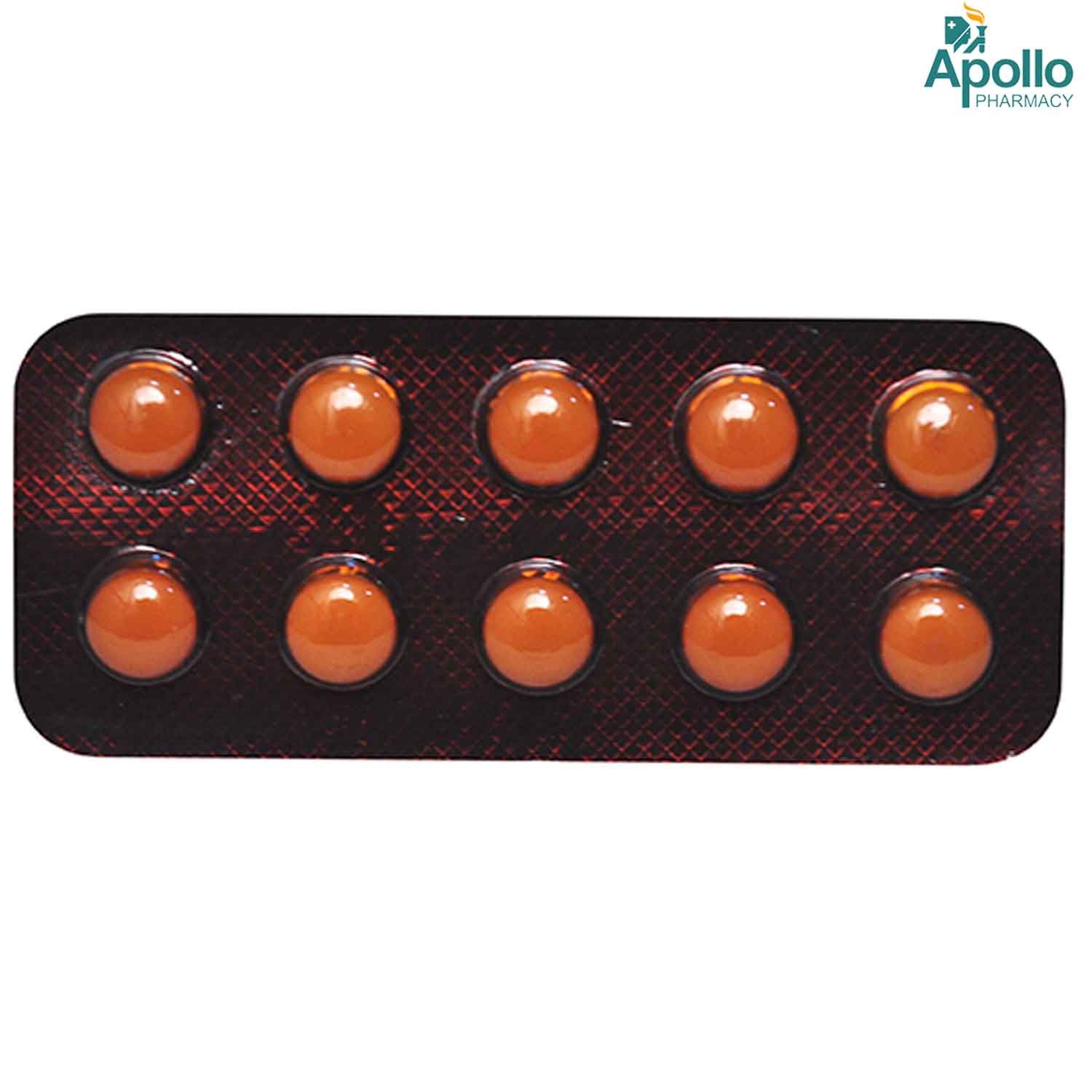
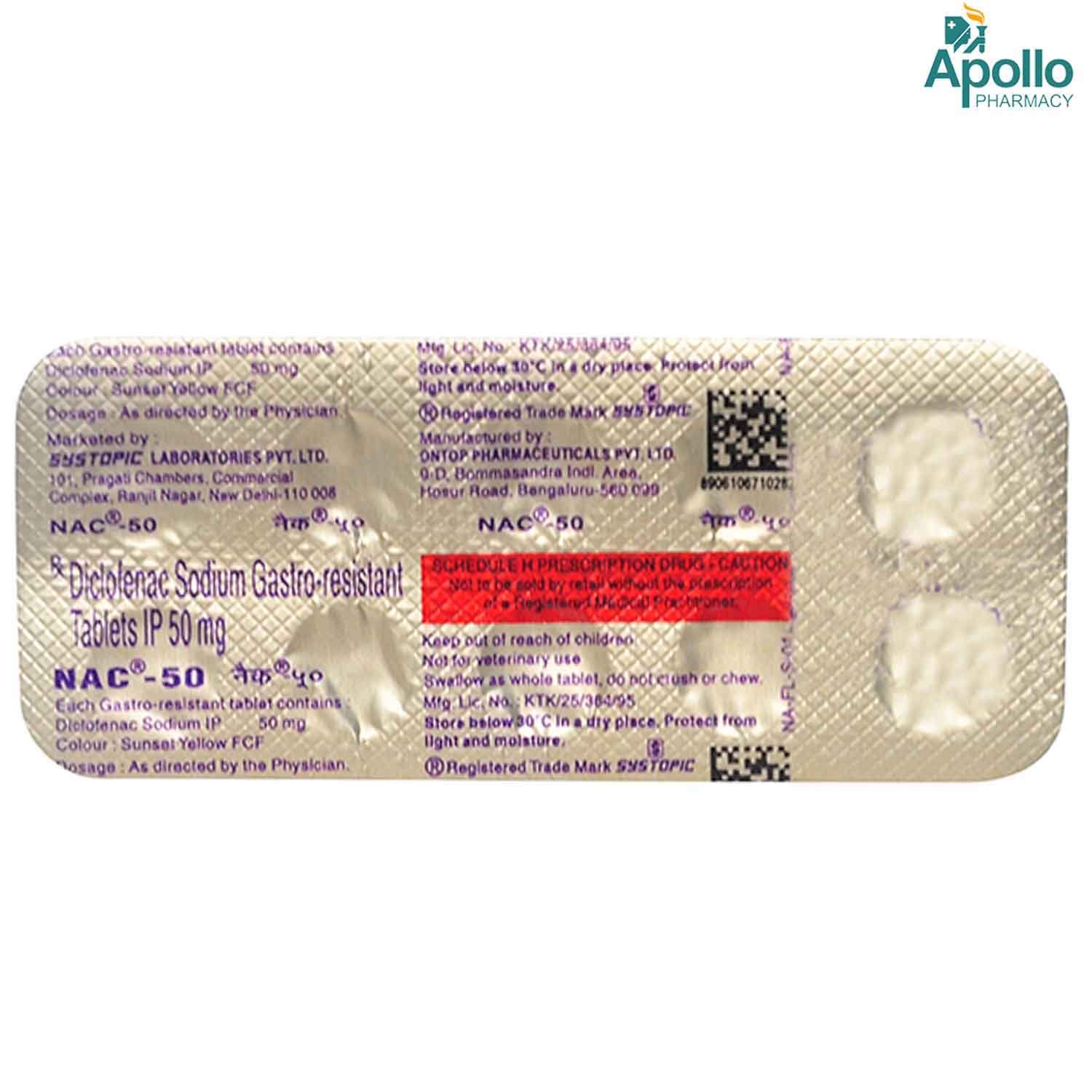





MRP ₹18
(Inclusive of all Taxes)
₹2.7 Cashback (15%)
Provide Delivery Location
Online payment accepted
 Prescription drug
Prescription drugWhats That
Synonym :
Composition :
Manufacturer/Marketer :
Consume Type :
Return Policy :
Expires on or after :
NPPA :
About Nac 50 Tablet
Nac 50 Tablet belongs to a group of medicines called non-steroidal anti-inflammatory drugs (NSAIDs) used to relieve pain and inflammation associated with migraine, muscle pain, dental pain, rheumatoid arthritis, ankylosing spondylitis, osteoarthritis, gout, strain, and sprain. Pain is an unpleasant sensation and emotional experience associated with tissue damage.
Nac 50 Tablet contains Diclofenac which works by blocking the effect of an enzyme called cyclo-oxygenase (COX) that produces prostaglandins responsible for the sense of pain and inflammation. Thereby, Nac 50 Tablet provides relief from pain and inflammation.
Nac 50 Tablet should be taken as prescribed. This medicine may cause certain side effects such as stomach pain, heartburn, nausea, vomiting, diarrhea, indigestion, loss of appetite, headache, and dizziness. Most of these side effects do not require medical attention and gradually resolve over time. However, if the side effects are persistent, reach out to your doctor.
Nac 50 Tablet should be avoided if allergic to it. Inform your doctor if you have stomach ulcers, gastric bleeding, severe heart failure, high blood pressure and liver or kidney disease before taking Nac 50 Tablet . Consult your doctor if you are pregnant, planning for pregnancy or breastfeeding. Nac 50 Tablet may cause dizziness; therefore, drive only if you are alert. Avoid alcohol consumption as it may cause increased dizziness and stomach irritation. Nac 50 Tablet is not recommended for use in children below 12 years of age as the safety is not established.
Uses of Nac 50 Tablet
Directions for Use
Medicinal Benefits
Nac 50 Tablet belongs to a group of medicines called non-steroidal anti-inflammatory drugs (NSAIDs). Nac 50 Tablet relieves mild to moderate pain, swelling and joint stiffness caused due to arthritis. It is also helpful in the conditions of acute migraine, muscle pain, dental pain, gout, sprain, and strain. Nac 50 Tablet works by blocking the effect of an enzyme called cyclo-oxygenase (COX) that produces prostaglandins responsible for the sense of pain and inflammation.
Storage
- Drink water or other clear fluids.
- To prevent worsening of pain, limit intake of tea, coffee, or alcohol.
- Include bland foods like rice, toast, crackers, and rice in your diet.
- Avoid lying down immediately after eating as it may cause indigestion or heartburn.
- Avoid acidic and spicy food as it may cause indigestion.
- Inform your doctor about your constipation symptoms. They may adjust your medication or advise alternative treatments.
- Stay hydrated by drinking sufficient of water (at least 8-10 glasses a day) to help soften stool and promote bowel movements.
- Increase fibre intake by eating foods high in fibre, such as fruits, whole grains, vegetables and legumes, to help bulk up the stool.
- Establish a bowel routine by trying to go to the bathroom at the same time each day to train your bowels.
- Engaging in regular exercise, like walking or yoga, can support in bowel movement stimulation.
- Consult your doctor if constipation persists, and discuss alternative treatments or adjustments to your medication.
- Inform Your Doctor: Notify your doctor immediately about your diarrhoea symptoms. This allows them to adjust your medication or provide guidance on managing side effects.
- Stay Hydrated: Drink plenty of fluids to replace lost water and electrolytes. Choose water, clear broth, and electrolyte-rich drinks. Avoid carbonated or caffeinated beverages to effectively rehydrate your body.
- Follow a Bland Diet: Eat easy-to-digest foods to help firm up your stool and settle your stomach. Try incorporating bananas, rice, applesauce, toast, plain crackers, and boiled vegetables into your diet.
- Avoid Trigger Foods: Steer clear of foods that can worsen diarrhoea, such as spicy, fatty, or greasy foods, high-fibre foods, and dairy products (especially if you're lactose intolerant).
- Practice Good Hygiene: Maintain good hygiene to prevent the spread of infection. To stay healthy, wash your hands frequently, clean and disinfect surfaces regularly, and avoid exchanging personal belongings with others.
- Take Anti-Diarrheal Medications: If your doctor advises, anti-diarrheal medications such as loperamide might help manage diarrhoea symptoms. Always follow your doctor's directions.
- Keep track of your diarrhoea symptoms. If they don't get better or worse or are accompanied by severe stomach pain, blood, or dehydration signs (like extreme thirst or dark urine), seek medical help.
- Take medications with food (if recommended): It can help prevent stomach distress and indigestion.
- Eat smaller, more frequent meals: Divide daily food intake into smaller, more frequent meals to ease digestion.
- Avoid trigger foods: Identify and avoid foods that trigger indigestion, such as spicy, fatty, or acidic foods.
- Stay upright after eating: Sit or stand upright for at least 1-2 hours after eating to prevent stomach acid from flowing into the oesophagus.
- Avoid carbonated drinks: Avoid drinking carbonated beverages, such as soda or beer, which can worsen indigestion.
- Manage stress: To alleviate indigestion, engage in stress-reducing activities like deep breathing exercises or meditation.
- Consult a doctor if needed: If indigestion worsens or persists, consult a healthcare professional to adjust the medication regimen or explore alternative treatments.
- Tell your doctor about your GAS symptoms. They may change your medication regimen or prescribe additional drugs to help you manage them.
- To manage GAS symptoms, eat a balanced diet of fibre, vegetables, and fruits.
- Drink enough water throughout the day to avoid constipation and treat GAS symptoms.
- Regular exercise like yoga and walking may help stimulate digestion and alleviate GAS symptoms.
- Take probiotics only if your doctor advises, as they may help alleviate GAS symptoms by promoting gut health.
- Take medication for GAS symptoms only if your doctor advises, as certain medications can interact with your existing prescriptions or worsen symptoms.
- If symptoms persist, worsen, or are accompanied by severe abdominal pain, vomiting, or bleeding, seek immediate medical attention.
- Inform your doctor about the nausea and discuss possible alternatives to the medication or adjustments to the dosage.
- Divide your daily food intake into smaller, more frequent meals to reduce nausea.
- Opt for bland, easily digestible foods like crackers, toast, plain rice, bananas, and applesauce.
- Avoid certain foods that can trigger nausea, such as fatty, greasy, spicy, and smelly foods.
- Drink plenty of fluids, such as water, clear broth, or electrolyte-rich beverages like coconut water or sports drinks.
- Use ginger (tea, ale, or candies) to help relieve nausea.
- Get adequate rest and also avoid strenuous activities that can worsen nausea.
- Talk to your doctor about taking anti-nausea medication if your nausea is severe.
- Record when your nausea occurs, what triggers it, and what provides relief to help you identify patterns and manage your symptoms more effectively.
Drug Warnings
Avoid taking Nac 50 Tablet if you are allergic to any of its components. Avoid taking Nac 50 Tablet if you have recently had heart bypass surgery as it may increase the risk of heart attack or stroke. Be cautious as Nac 50 Tablet may also increase the risk of stomach or intestinal bleeding. Inform your doctor if you have stomach ulcers, gastric bleeding, severe heart failure, high blood pressure and liver or kidney disease. If you have/had a severe allergy to painkillers and have conditions like asthma, rhinitis, angioedema (swelling under the skin) or skin rashes, do not take Nac 50 Tablet . Nac 50 Tablet not recommended for children under 12 years of age. Consult your doctor if you are pregnant or breastfeeding.
Drug-Drug Interactions
Drug-Drug Interactions
Login/Sign Up
Co-administration of Nac 50 Tablet with Meloxicam can increase the risk or severity of gastrointestinal side effects.
How to manage the interaction:
Taking Meloxicam with Nac 50 Tablet is not recommended as it can possibly result in an interaction, it can be taken if your doctor has advised it. However, consult your doctor immediately if you experience symptoms such as dizziness, lightheadedness, red or black, tarry stools, coughing up or vomiting fresh or dried blood that looks like coffee grounds, severe headache, and weakness. Do not stop any medication without doctor's advise.
Taking Dasatinib together with Nac 50 Tablet may increase the risk of bleeding.
How to manage the interaction:
There may be a possible interaction between Nac 50 Tablet and Dasatinib but they can be taken together if a doctor has prescribed them. However, consult a doctor immediately if you experience dizziness, red or black, tarry stools, or severe headaches. Do not discontinue any medications without consulting a doctor.
Co-administration of Rivaroxaban together with Nac 50 Tablet may increase the risk of unsual bleeding.
How to manage the interaction:
Co-administration of Nac 50 Tablet and Rivaroxaban can lead to an interaction; it can be taken if advised by your doctor. However, if you experience any symptoms like unusual bleeding or bruising, dizziness, lightheadedness, red or black, tarry stools, coughing up or vomiting fresh or dried blood that looks like coffee grounds, severe headache, and weakness, consult your doctor immediately. Do not stop using any medications without a doctor's advice.
Taking Nac 50 Tablet with human immunoglobulin may increase the risk of kidney problems.
How to manage the interaction:
Although there is an interaction between Human immunoglobulin and Nac 50 Tablet, you can take these medicines together if prescribed by a doctor. However, consult the doctor immediately if you experience symptoms such as nausea, vomiting, loss of appetite, increased or decreased urination, sudden weight gain or weight loss, fluid retention, swelling, shortness of breath, muscle cramps, tiredness, weakness, dizziness, confusion, and irregular heart rhythm. Do not discontinue any medications without consulting a doctor.
Taking Nac 50 Tablet and piroxicam can increase the risk of side effects such as ulcers, inflammation (redness, swelling), bleeding.
How to manage the interaction:
Co-administration of Nac 50 Tablet and Piroxicam can lead to an interaction, it can be taken if advised by a doctor. However, if you experience any symptoms like unusual bleeding or bruising, dizziness, lightheadedness, red or black, tarry stools, coughing up or vomiting fresh or dried blood that looks like coffee grounds, severe headache, and weakness, consult a doctor immediately. Do not stop using any medications without a doctor's advice.
Concomitant use of Nac 50 Tablet with dabigatran may increase the risk of stomach bleeding.
How to manage the interaction:
Taking Nac 50 Tablet with dabigatran together possibly results in an interaction, it can be taken if your doctor has advised it. You should consult a doctor immediately if you experience any unusual bleeding or bruising or have other signs and symptoms of bleeding such as dizziness, light headedness, red or black, tarry stools, coughing up or vomiting fresh or dried blood that looks like coffee grounds, severe headache and weakness. Do not stop using any medications without first talking to your doctor.
Taking Nac 50 Tablet with Vorapaxar can increase the risk of bleeding complications.
How to manage the interaction:
There may be a possible interaction between Nac 50 Tablet and Vorapaxar, but they can be taken together if your doctor has prescribed them. However, consult your doctor immediately if you experience any unusual bleeding, dizziness, lightheadedness, red or black, tarry stools, coughing up or vomiting fresh or dried blood that looks like coffee grounds, severe headaches. Do not discontinue any medications without consulting your doctor.
Taking Valdecoxib with Nac 50 Tablet may increase risk of side effects.
How to manage the interaction:
There may be a possible interaction between Nac 50 Tablet and Valdecoxib but can be taken if prescribed by doctor. However, consult your doctor immediately if you experience any unusual bleeding or bruising or have other signs and symptoms of bleeding such as dizziness, lightheadedness, red or black, tarry stools, coughing up or vomiting fresh or dried blood that looks like coffee grounds, severe headache, and weakness. Do not stop any medications without consulting a doctor.
Taking prasugrel together with Nac 50 Tablet may increase the risk of bleeding.
How to manage the interaction:
Co-administration of Nac 50 Tablet and Prasugrel can lead to an interaction; it can be taken if advised by a doctor. However, if you experience any symptoms like unusual bleeding or bruising, dizziness, lightheadedness, red or black, tarry stools, coughing up or vomiting fresh or dried blood that looks like coffee grounds, severe headache, and weakness, consult your doctor immediately. Do not stop using any medications without a doctor's advice.
Co-administration of Nac 50 Tablet with Sirolimus may increase the risk or severity of kidney problems.
How to manage the interaction:
Co-administration of Nac 50 Tablet and Sirolimus can lead to an interaction, but it can be taken if advised by a doctor. However, consult a doctor if you experience any symptoms like nausea, vomiting, loss of appetite, increased or decreased urination, sudden weight gain or weight loss, fluid retention, swelling, shortness of breath, muscle cramps, tiredness, weakness, dizziness, confusion, and irregular heart rhythm. Do not discontinue any medications without consulting a doctor.
Drug-Food Interactions
Drug-Food Interactions
Login/Sign Up
Diet & Lifestyle Advise
- Include turmeric and fish oils as they help in reducing inflammation.
- Please do not go for heavy exercise as it may increase joint pain in arthritis. Instead, you can do stretching, low impact aerobic exercises like walking on a treadmill, bike riding and swimming. You can also strengthen your muscle strength by lifting light weights.
- Include fish like salmon, trout, tuna and sardines. These fishes are enriched with omega-3 fatty acids that ramp up inflammation.
- Your sitting posture is important, especially when you have pain and inflammation conditions. Try to sit as little as possible and only for a short time (10-15 min). Use back support like a rolled-up towel at the back of the curve to minimise pain. Keep your knees and hips at a right angle. Besides this, you can use a footrest if required.
- Adopting a healthy lifestyle coupled with a diet containing high proteins is the mainstay in the management of arthritic conditions.
Side Effects of Nac 50 Tablet
- Stomach pain
- Heartburn
- Nausea
- Vomiting
- Diarrhea
- Indigestion
- Loss of appetite
- Headache
- Dizziness
Habit Forming
Therapeutic Class
Product Substitutes
Author Details
We provide you with authentic, trustworthy and relevant information
Drug-Diseases Interactions
Drug-Diseases Interactions
Login/Sign Up
FAQs
Nac 50 Tablet works by blocking the effect of an enzyme called cyclo-oxygenase (COX) that produces prostaglandins responsible for the sense of pain and inflammation. Thereby, provides relief from pain and inflammation.
Nac 50 Tablet can be stopped if it is advised for short-term pain relief. In case, Nac 50 Tablet has been prescribed for long-term usage, it is advised to continue as advised by your doctor.
Nac 50 Tablet may cause dizziness in some patients. Drive only if you are alert after taking Nac 50 Tablet and omit driving if you feel dizzy.
No, Nac 50 Tablet is not indicated for stomach pain. If you have symptoms of stomach pain, contact your doctor.
Drug-Drug Interactions Checker List
- NIMESULIDE
- OXYPHENBUTAZONE
- METAMIZOLE
- WARFARIN
- HYDROCHLOROTHIAZIDE
- LITHIUM
Special Advise
Disease/Condition Glossary
Pain: It is an unpleasant sensation and emotional experience associated with tissue damage. Pain can be short-term (acute) or long-term (chronic). Perception of pain can differ from person to person, from tolerable to non-tolerable.
Rheumatoid arthritis: Rheumatoid arthritis is a chronic inflammatory disorder affecting various joints (hands and feet). In this condition, the body's immune system attacks its own tissue (including joints).
Ankylosing spondylitis: Ankylosing spondylitis is a rare type of arthritis that affects the spine and larger joints, causing extreme pain and stiffness.
Osteoarthritis: It is a joint disease in which the two ends of the joints come together due to the breakdown of a protective covering called cartilage. Due to the absence of this protective covering, the joints rub against each other, leading to pain and stiffness. Symptoms include pain, stiffness, inflammation and tenderness.

Have a query?
Buy best C.n.s Drugs products by
Intas Pharmaceuticals Ltd
Sun Pharmaceutical Industries Ltd
Torrent Pharmaceuticals Ltd
Alkem Laboratories Ltd
Abbott India Ltd
Cipla Ltd
Alteus Biogenics Pvt Ltd
Micro Labs Ltd
Lupin Ltd
Ipca Laboratories Ltd
D D Pharmaceuticals Pvt Ltd
Icon Life Sciences
Mankind Pharma Pvt Ltd
Tripada Healthcare Pvt Ltd
Arinna Lifesciences Ltd
Linux Laboratories Pvt Ltd
East West Pharma India Pvt Ltd
La Renon Healthcare Pvt Ltd
Talent India Pvt Ltd
Tas Med India Pvt Ltd
Zydus Healthcare Ltd
Cnx Health Care Pvt Ltd
Eris Life Sciences Ltd
Leeford Healthcare Ltd
Emcure Pharmaceuticals Ltd
Macleods Pharmaceuticals Ltd
Sigmund Promedica
Aristo Pharmaceuticals Pvt Ltd
Dr Reddy's Laboratories Ltd
Troikaa Pharmaceuticals Ltd
Consern Pharma Ltd
Zydus Cadila
Shine Pharmaceuticals Ltd
Wockhardt Ltd
Ardent Life Sciences Pvt Ltd
Crescent Formulations Pvt Ltd
Theo Pharma Pvt Ltd
Reliance Formulation Pvt Ltd
Ikon Pharmaceuticals Pvt Ltd
Propel Healthcare
Neon Laboratories Ltd
Jagsam Pharma
Msn Laboratories Pvt Ltd
Morepen Laboratories Ltd
Pulse Pharmaceuticals
Sanofi India Ltd
Med Manor Organics Pvt Ltd
Hetero Healthcare Pvt Ltd
Novartis India Ltd
Crescent Therapeutics Ltd
Elder Pharmaceuticals Ltd
Solvate Laboratories Pvt Ltd
Akumentis Healthcare Ltd
Mova Pharmaceutical Pvt Ltd
Psyco Remedies Ltd
Tripada Lifecare Pvt Ltd
Ajanta Pharma Ltd
Cyrus Remedies Pvt Ltd
Medishri Healthcare Pvt Ltd
Cadila Healthcare Ltd
Glenmark Pharmaceuticals Ltd
Matteo Health Care Pvt Ltd
Hbc Life Sciences Pvt Ltd
Lyf Healthcare
Matias Healthcare Pvt Ltd
Mesmer Pharmaceuticals
Alembic Pharmaceuticals Ltd
Capital Pharma
Crescent Pharmaceuticals
Medopharm Pvt Ltd
Alniche Life Sciences Pvt Ltd
Kivi Labs Ltd
Talin Remedies Pvt Ltd
USV Pvt Ltd
Quince Lifesciences Pvt Ltd
Solis Pharmaceuticals
Infivis Life Care
Zuventus Healthcare Ltd
Cadila Pharmaceuticals Ltd
Pfizer Ltd
Wallace Pharmaceuticals Pvt Ltd
A N Pharmacia Laboratories Pvt Ltd
Blue Cross Laboratories Pvt Ltd
Jenburkt Pharmaceuticals Ltd
Lia Life Sciences Pvt Ltd
Mano Pharma
Medley Pharmaceuticals Ltd
Primus Remedies Pvt Ltd
FDC Ltd
Maneesh Pharmaceuticals Ltd
Apex Laboratories Pvt Ltd
Gagnant Healthcare Pvt Ltd
Ozone Pharmaceuticals Ltd
RPG Life Sciences Ltd
Strides Shasun Ltd
Unichem International
GlaxoSmithKline Pharmaceuticals Ltd
Kuresys Labs Pvt Ltd
LA Pharma
Trion Pharma India Llp
Alcohol
Unsafe
You are recommended not to consume alcohol along with Nac 50 Tablet to avoid unpleasant side effects.
Pregnancy
Unsafe
Nac 50 Tablet is not recommended during pregnancy. Please consult your doctor. Your doctor will prescribe an alternative medicine after overweighing the benefits over the risks.
Breast Feeding
Caution
There is not enough evidence to establish the safety of Nac 50 Tablet in nursing mothers. So, it is advisable to take Nac 50 Tablet only if prescribed by your doctor.
Driving
Caution
Nac 50 Tablet may cause dizziness. So avoid driving or drive only if you are alert.
Liver
Caution
If u have or had a history of any liver-related diseases, please consult the doctor before taking Nac 50 Tablet .
Kidney
Caution
If you have or had a history of kidney-related diseases, please consult the doctor before taking Nac 50 Tablet .
Children
Unsafe
Nac 50 Tablet not recommended for children under 12 years of age.







